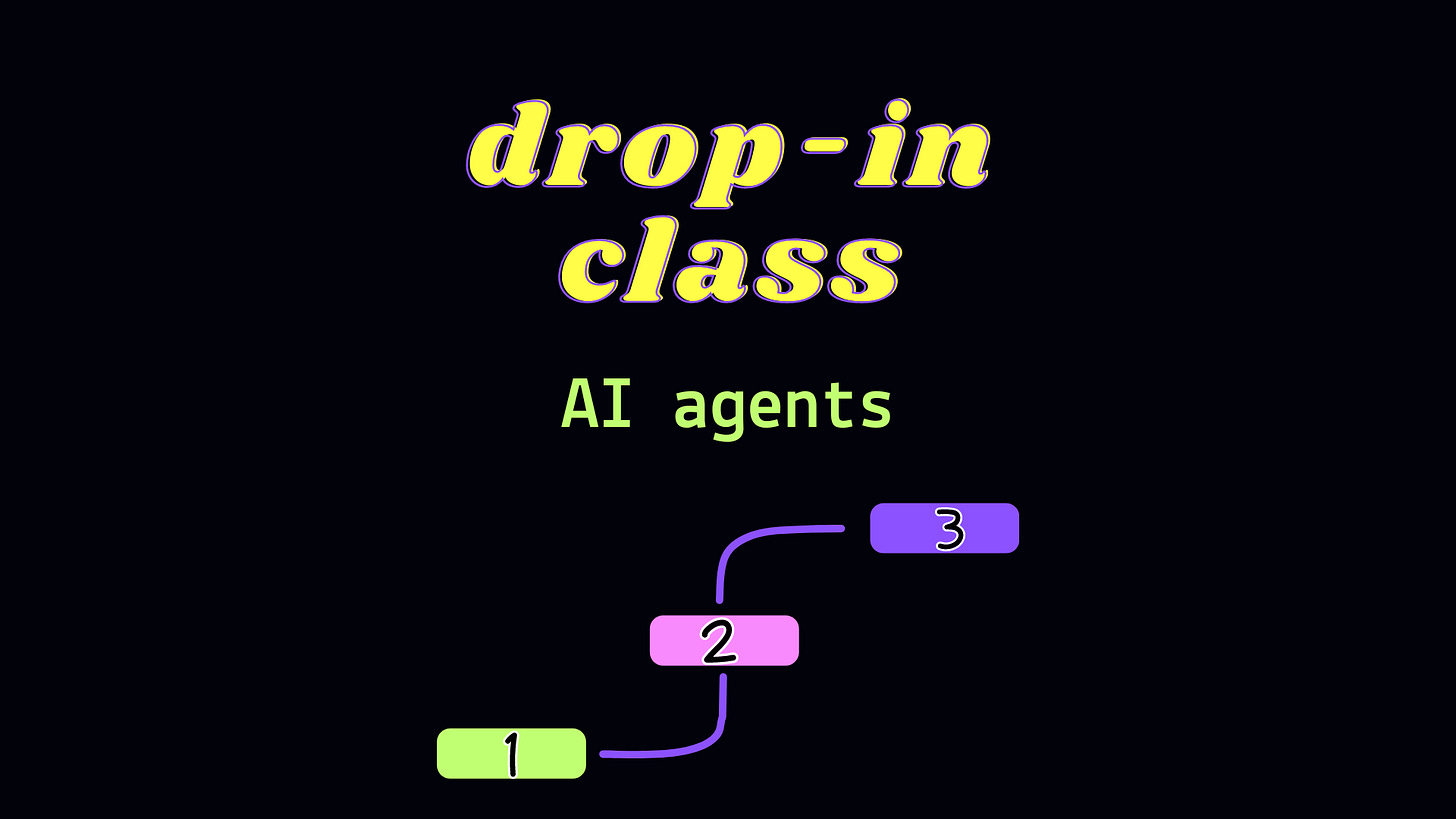Welcome to my newsletter, which I call Drop-In Class because each edition is like a short, fun Peloton class for technology concepts. Except unlike a fitness instructor, I'm not an expert yet: I'm learning everything at the same time you are. Thanks for following along with me as I "learn in public"!
Why AI agents matter right now
Move over, copilots! The headlines this week were all about AI agents.
Microsoft, Salesforce, HubSpot and Workday all recently announced AI-powered agents. Other tech giants like Google, Apple and Amazon are working on theirs. It’s only a matter of time before you’re using an AI agent in some way on some app you’re using.
So what’s an AI agent? It’s kind of a fancy word for an AI assistant. Not just a chat that answers questions, but something that can handle a series of tasks for you, without your intervention.
Forrester named AI agents one of the top emerging technologies in 2024. Let’s learn a little more about these agents and what they can do for us.
Here’s our on-theme music for today!
Copilots today, AI agents tomorrow
Copilots were one of the first GenAI offerings that companies started building. A copilot is a conversational chatbot interface built into whatever you’re using. If you’re in GitHub, you can have GitHub Copilot generate code. If you’re in Photoshop, you can have Adobe Firefly generate art from a text prompt. If you’re in Powerpoint, Microsoft 365 Copilot will generate your presentation from a Word doc.
The key to a copilot is the “co.” There’s back-and-forth between you and the copilot, and you’re working on something in tandem. It can give suggestions, but it doesn’t make decisions independently. It’s not autopilot.
(By the way, does the word “autopilot” make you think of AUTO, the evil autopilot in WALL-E? Just me?)
An agent, on the other hand, is autonomous. It doesn’t communicate with the human at every point. An agent can reason through which actions to take, determine what inputs it needs for those actions, and even communicate with other agents or humans.
For example:
An AI loan officer could handle gathering your documents, processing them, making sure everything is correct, and answering your questions along the way. (This exists!)
An AI sales rep could get an inbound lead, qualify the lead, draft and send the follow-up email, and book a meeting. (This also exists!)
An AI travel agent could proactively investigate flight options, choose the best flight for you, and book you on that flight with your seating preferences. (I don’t know if this exists but it would be cool because I hate booking flights.)
I’ve complained about how chatbots are the only use case for GenAI anyone can come up with. Copilots are a useful step for chat assistants, but they’re getting mixed reviews. AI agents seem to be the next wave with more sophisticated abilities.
Which is why companies like Apple are upgrading their AI offerings to agents. Siri is getting a promotion.
How do AI agents work?
Here’s a better question: How many different things do you need to do, before you get a thing done?
Let’s say you’re an SDR following up on an inbound lead. You get notified through Salesforce. Then you review details about the lead, assess the lead’s quality based on their profile and lead scoring guidelines, decide to reach out, draft the email, send the email through HubSpot, update the lead status in Salesforce….it’s a lot. One task is really a collection of tasks.
It’s no different for an AI agent. It needs to do a whole collection of steps.
AI agents generally work like this:
Data collection & analysis: The agent gathers information and examines it to get the insights and patterns it needs, like a lead profile in a CRM system.
Decision-making: Using algorithms, predictive machine learning or rules-based logic, the agent decides how to proceed — like qualifying the lead and deciding to reach out.
Action execution: The agent takes action, like drafting and sending the email.
The challenge with all this? It means linking together multiple systems, multiple reasoning steps, and probably multiple models. A single LLM (large language model) can’t do it all. It’s going to take compound AI systems with more moving parts.
Setting up a basic RAG system to improve your chatbot’s response is one thing. Creating an AI agent? That’s opening up a whole new can of worms. It’s going to be fascinating to see how developers start building these things.
The cooldown: Extra reading
This is a 101-level drop-in, so I keep things at a high level! For deeper reading, check out these articles. There were a lot of good ones this time, with all the AI agent news happening!
What are AI Agents? A Complete Guide (Salesforce)
Every White-Collar Role Will Have An AI Copilot. Then An AI Agent. (Andreessen Horowitz)
What exactly is an AI agent? (TechCrunch)
See you in the next Drop-In!
Cheers,
Alex


